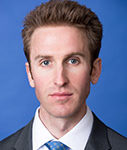Event Information:
-
Tue10Apr20185:30 pm - 7:00 pm2150 Shattuck Ave, Ste 230
Chain Reactions: Technological Innovation, Nuclear Programs, and the Security Dilemma
Come see Tristan A. Volpe, Assistant Professor, Naval Postgraduate School speak about how technical innovation affects security!
 A nuclear weapons program tends to create an intense security dilemma with a high risk of war as other nations consider using force to forestall an adverse shift in the balance of power, but civilian energy programs often avoid this fate by revealing peaceful intentions. How do major changes in the pool of technology used to produce nuclear weapons impact the severity of this proliferation security dilemma? This paper identifies two variables: (1) whether the technology is best suited for the clandestine acquisition of weapons or in support of civilian programs with latency, and (2) whether the innovation makes it easier to distinguish intent and reveal program type. I demonstrate the plausibility of this logic with vignettes about the historical diffusion of dual-use nuclear technology, and use this foundation to forecast how rapidly emerging technologies such as Additive Manufacturing might shape future proliferation dynamics.
A nuclear weapons program tends to create an intense security dilemma with a high risk of war as other nations consider using force to forestall an adverse shift in the balance of power, but civilian energy programs often avoid this fate by revealing peaceful intentions. How do major changes in the pool of technology used to produce nuclear weapons impact the severity of this proliferation security dilemma? This paper identifies two variables: (1) whether the technology is best suited for the clandestine acquisition of weapons or in support of civilian programs with latency, and (2) whether the innovation makes it easier to distinguish intent and reveal program type. I demonstrate the plausibility of this logic with vignettes about the historical diffusion of dual-use nuclear technology, and use this foundation to forecast how rapidly emerging technologies such as Additive Manufacturing might shape future proliferation dynamics.Tristan Volpe is an assistant professor in the Defense Analysis Department of the U.S. Naval Postgraduate School (NPS) in Monterey, California. He is a nonresident fellow in the Nuclear Policy Program at the Carnegie Endowment for International Peace. Volpe focuses on issues at the intersection of nuclear proliferation, emerging technology, and regional security in East Asia, Europe, and the Middle East. His work has been published in journals such as Foreign Affairs, Security Studies, The Washington Quarterly, and The Nonproliferation Review. Previously, Volpe was a fellow at the Carnegie Endowment for International Peace, where he assessed the impact of rapid technological and geopolitical change on nuclear proliferation. As Carnegie’s 2015 Stanton Nuclear Security Fellow, Volpe published a series of articles explaining when nuclear latency provides regional powers with bargaining leverage in world politics, and how the United States could tailor its nonproliferation strategy in response. From 2013 to 2015, Volpe was a Lawrence Scholar at Lawrence Livermore National Laboratory (LLNL), where he served briefly as a consultant to the Bureau of International Security and Nonproliferation at the U.S. Department of State. He received a Ph.D. in political science from the George Washington University and a B.A. in political science from the University of California, Los Angeles.

